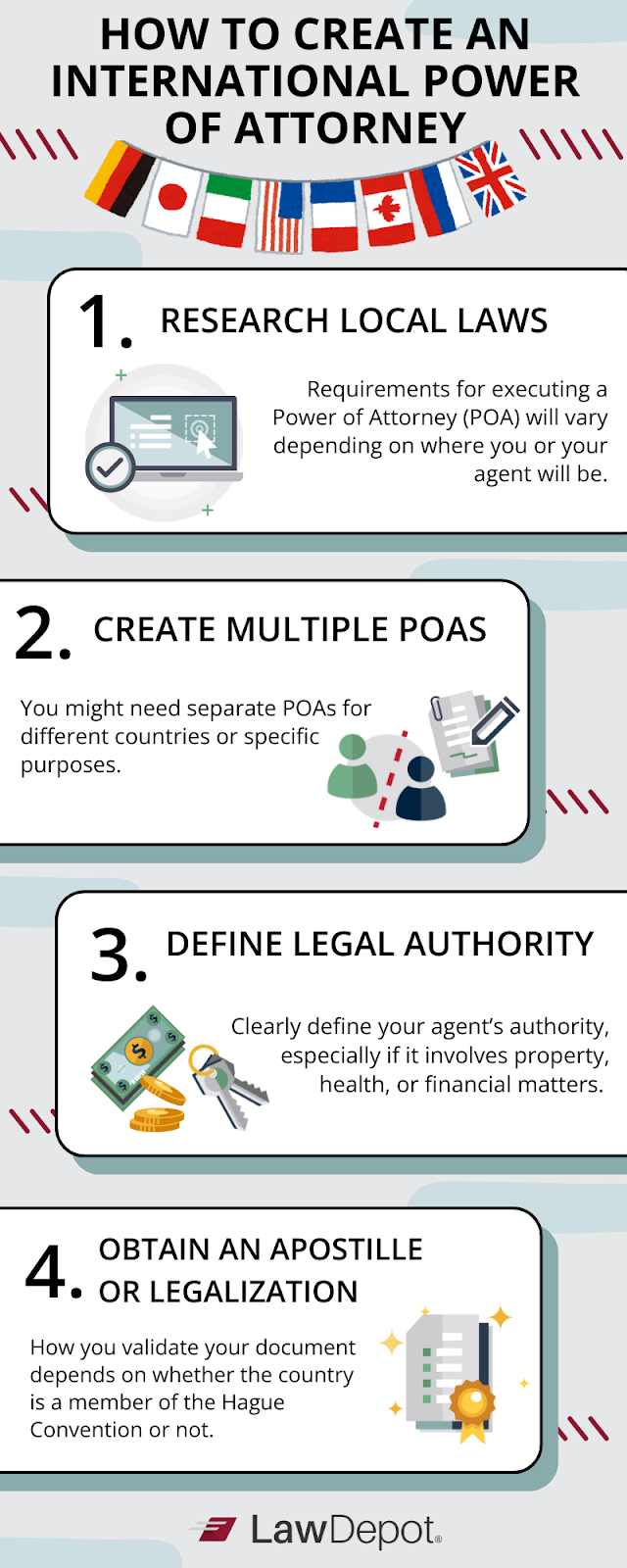
The basics of a Power of Attorney
- The ability to make decisions on the principal’s behalf
- A fiduciary duty to act in the principal’s best interests
- Specific powers related to business, real estate, finances, legal matters, and more
| Check out LawDepot’s Power of Attorney template to learn more about the different types of POAs you can create and the powers they grant. |
- When owning property in a foreign country , whether a vacation home or investment property, a POA helps to manage rental income, maintenance, and potential sales.
- For those involved in international business , a POA can be crucial for handling contracts, opening bank accounts, and managing day-to-day operations.
- While less common, a Medical POA is beneficial if you anticipate extended stays abroad and require medical care.
- An international POA can be a vital component of comprehensive estate planning for those with assets in multiple countries.
How international laws affect a Power of Attorney
Jurisdictional challenges
- A Mexican consulate must typically authenticate a foreign POA before it’s recognized in Mexico.
- The person appointed as the agent must often be a Mexican resident or have a specific legal status in Mexico.
- A certified Spanish translation of the POA is usually required.
- Mexico also has specific POA types for different actions (e.g., property management, and healthcare), so a general POA may not suffice.
Creating multiple POAs for use in different countries
- Research local laws: Requirements for executing a POA will vary depending on where you or your agent will be.
- Create multiple POAs: You might need separate POAs for different countries or specific purposes. LawDepot offers Powers of Attorney in countries worldwide; each template is built by our legal team to be valid in the state or country it’s created for.
- Define legal authority: Clearly define your agent's authority, especially if it involves property, health, or financial matters. If you’re creating multiple POAs, give the agent(s) under each POA unique powers. Having two conflicting POAs with agents with the same powers could cause issues.
- Obtain an apostille or legalization: Some countries require an apostille (for Hague Convention member countries) or legalization (for non-member countries) to validate a foreign document. Typically, the POA must be notarized before the signer can get an apostille or legalization.
Understanding apostilles
Note: The apostille process can take several weeks, so plan accordingly!
Specific considerations for U.S. residents
- Understands the cultural context and values of the person they’re representing
- Is fluent in the language or has a certified translator to help
Selecting the right attorney-in-fact for international matters
| Advantages | Disadvantages |
| ✅ A local attorney-in-fact is familiar with laws, culture, and business practices, which can be invaluable. | ❌Cultural differences and language barriers could lead to misinterpretations. |
| ✅ If there's a significant time difference, having an agent in the proper time zone can facilitate communication and decision-making. | ❌ Physical distance can hinder effective communication and problem-solving. |
| ✅ An international POA provides reassurance that your affairs are being handled competently and efficiently, even when you are far away. | ❌ In case of emergencies, there may be delays in responding due to geographical distance. |
- Trustworthiness: The individual must be completely trustworthy and have your best interests at heart.
- Financial responsibility: Strong financial management skills are crucial, especially if the POA involves handling assets.
- Legal knowledge: Understanding both US and foreign laws related to the POA is beneficial.
- Language proficiency: If the foreign jurisdiction has a different primary language, language proficiency is essential.
- Availability and responsiveness: The agent should be readily available to address matters promptly.
How to make an international power of attorney




